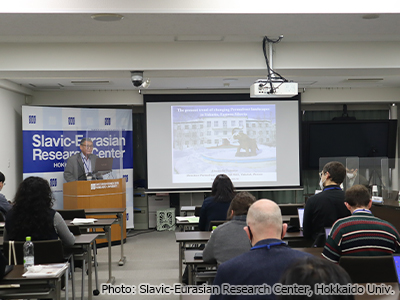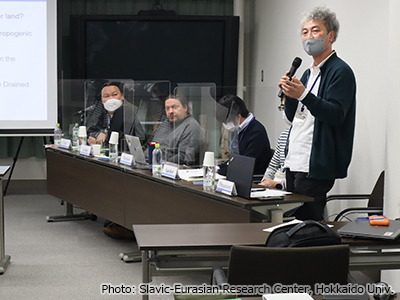International Symposium “Above the Permafrost: How Climate Change and Resource Development Are Changing Local Life in the Arctic” was held
Reported by Tabata Shinichiro (Hokkaido University)
Related Research Program:Human Society /
International Research Exchange Program “East Asia in the Arctic: Communities, development and Cultures”
The annual international symposium “Above the Permafrost: How Climate Change and Resource Development are Changing Local Life in the Arctic” was held at Slavic-Eurasian Research Center (SRC) of Hokkaido University from the 14th to the 16th of December 2022. This symposium was sponsored by the research program “Human Security, Energy and Food in the Arctic under Climate Change” in the Arctic Challenge for Sustainability II (ArCS II) and its International Research Exchange Program “East Asia in the Arctic,” and Center for Northeast Asian Studies (CNEAS) of Tohoku University, as well as by the Platform for Explorations in Survival Strategies at SRC.


Eleven speakers from overseas countries, including Finland, USA, Russia, Norway, and Canada, and 16 speakers and moderators from Japan participated in the international symposium, which was conducted only in person for the first time in three years. More than 58 people including the audience gathered to discuss the common theme.
Reflecting the direction of interdisciplinary research promoted in ArCS II, many researchers of natural sciences attended at the symposium unlike usual international symposia at SRC. Keynote speeches on the themes of the relation between resource development in the Arctic and climate change were followed by five sessions, in which were discussed topics such as permafrost degradation, livelihood and other economic activities of indigenous people including the Sakha, their culture and identity, and the perspective of sustainable development. Ten out of the 19 presentations were concerned with the Republic of Sakha (Yakutia), as many results of the research program are based on field research conducted in the Republic. The discussions in person stimulated the participants who have not been able to communicate on a face-to-face basis in recent years due to COVID-19. This symposium brought fruitful results, promising the future expansion of cross-border research cooperation.
